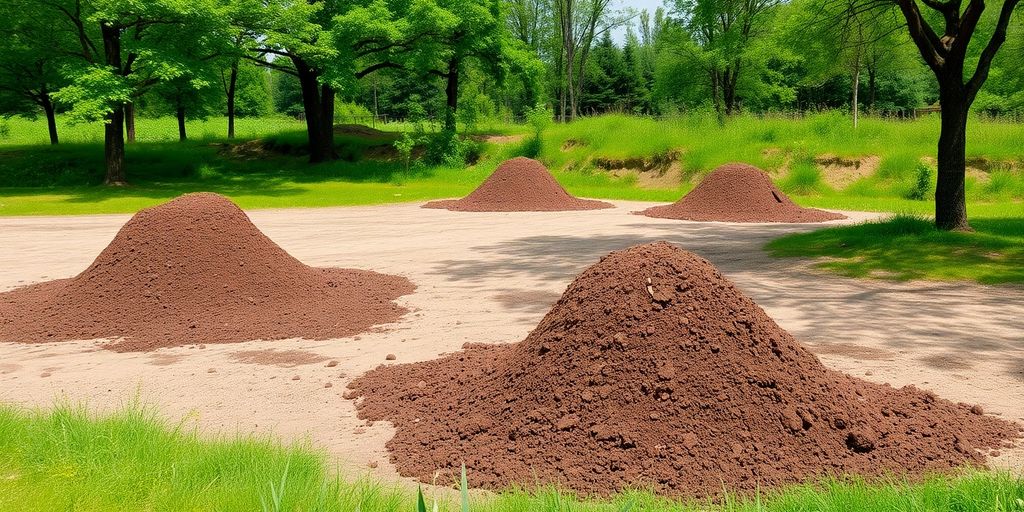This guide provides essential information on how to dispose of dirt in an eco-friendly way. Whether you’re a homeowner, landscaper, or contractor, knowing where to dump dirt responsibly can help protect the environment and save you money. From free dump sites to recycling programs, discover the best options for dirt disposal near you.
- Discovering Who Has Trulicity in Stock Near Me: A Comprehensive Guide to Availability
- Discover the Top Breakfast Place Near Me: A Guide to the Best Local Spots
- Discover the Best Brunch Places Near Me for a Perfect Weekend Escape
- Discover the Best Day Spa Near Me for Ultimate Relaxation
- Discovering the Best Veg Thali Near Me: A Culinary Journey
Key Takeaways
- Look for free dirt dump sites in your area to save money.
- Consider composting or recycling programs for eco-friendly disposal.
- Use local municipal services for yard waste collection.
- Rent a dumpster if you have a lot of dirt to dispose of.
- Check for contaminants in your soil before disposal.
Understanding Free Dirt Dump Sites
Free dirt dump sites are important for anyone looking to dispose of excess soil without spending money. These sites help save costs and promote eco-friendly practices. They are useful for contractors, landscapers, and homeowners alike. Here’s what you need to know:
Benefits of Free Dirt Dump Sites
- Cost Savings: You can dispose of or acquire dirt without any fees.
- Environmental Impact: These sites encourage recycling and reusing dirt, which is better for the planet.
- Community Support: They help neighbors and businesses work together, sharing resources and reducing waste.
How to Locate Free Dirt Dump Sites
Finding these sites can be easy if you know where to look:
- Online Resources: Websites like DirtMatch.com can help you find local dump sites.
- Local Builders: Ask construction companies in your area; they often know where to dump dirt.
- Government Agencies: Check with local environmental offices for information on public dump sites.
Preparing Your Dirt for Disposal
To make the process smooth, follow these steps:
- Clean the Dirt: Remove any trash or contaminants like metal or plastic.
- Check Quality: Some sites have rules about the type of dirt they accept.
- Plan Transport: Decide how you will get the dirt to the site, whether by truck or your own vehicle.
Remember, using free dirt dump sites can greatly benefit both your wallet and the environment. By preparing properly and following local rules, you can make the most of these valuable resources.
Eco-Friendly Dirt Disposal Methods
Composting Yard Waste
Composting is a great way to turn organic materials from your yard into something useful. You can use leaves, grass clippings, and even some clean fill dirt to create nutrient-rich compost. Here’s how to get started:
- Create a compost pile by layering green waste (like grass clippings) with brown waste (like dry leaves).
- Maintain the pile by turning it regularly to help it break down.
- Use your compost to enrich the soil in your garden.
| Step | Action |
|---|---|
| Start Your Pile | Mix green and brown materials. |
| Maintenance | Turn your pile regularly. |
| Utilization | Apply compost to your garden soil. |


Utilizing Local Recycling Programs
Another option is to use local recycling programs that accept dirt. These facilities can take clean fill dirt and repurpose it for construction or landscaping. Here’s what to do:
- Contact your local facility to find out if they accept yard dirt and what their guidelines are.
- Prepare your dirt by removing any non-soil materials like roots, rocks, or debris.
- Make sure the dirt is clean and free from contaminants to ensure it can be accepted.
Hiring Professional Junk Removal Services
If you have a lot of dirt to get rid of, hiring a professional junk removal service can be a smart choice. They can handle the heavy lifting and make the process easier for you. Here are some benefits:
- Convenience: They take care of everything for you.
- Efficiency: They can quickly remove large amounts of dirt.
- Cost-effective: It can save you time and effort.
Remember: Always check with your local landfill to see if they accept dirt, as not all places do. Some may even offer free disposal options under certain conditions.
By using these eco-friendly waste disposal options, you can ensure that your dirt is handled responsibly and benefits the environment.
Using Municipal Services for Dirt Disposal
Municipal Yard Waste Collection
Many towns and cities provide yard waste collection as part of their regular trash services. This can be a great way to get rid of excess dirt without much hassle. Check with your local municipality to see if they offer this service. Here are some key points to consider:
- Convenience: The local government handles the collection for you.
- Regulations: You may need to follow specific rules, like using special bags.
- Availability: Not all areas offer this service, so confirm with your local office.
Local Recycling Drop-Off Sites
If you prefer to take matters into your own hands, many areas have recycling drop-off sites. These places allow you to dispose of yard waste, including dirt, which can be turned into compost. Here’s what to keep in mind:
- Hours of Operation: Check when the site is open.
- Preparation: Make sure your dirt is clean and free of debris.
- Cost: Most sites are free, but some may charge a small fee.
Community Fill Sites
Read More : Discover the Top Places to Buy Vapes Near Me: Your Ultimate Guide
Some communities have designated fill sites where residents can dump excess dirt. This is often a free service, but it’s important to know the rules:
- Location: Find out where the nearest fill site is located.
- Limits: There may be restrictions on how much dirt you can drop off.
- Condition: Ensure the dirt is uncontaminated to avoid issues.
Using municipal services for dirt disposal can save you time and effort. Always check local guidelines to ensure a smooth process.
Renting Dumpsters for Dirt Disposal
Renting a dumpster is a great way to get rid of excess dirt from your yard. This method is simple and effective for handling large amounts of soil. Here’s what you need to know:
Choosing the Right Dumpster Size
When renting a dumpster, you can choose from different sizes based on how much dirt you have:
- 10-yard dumpster: Good for small to medium projects.
- 20-yard dumpster: Best for medium to large jobs.
- 30-yard dumpster: Suitable for bigger land clearing tasks.
Cost Considerations
The price for renting a dumpster can vary widely. Here’s a quick look at typical costs:
| Dumpster Size | Estimated Cost Range |
|---|---|
| 10-yard | $150 – $650 |
| 20-yard | $225 – $1,100 |
| 30-yard | $263 – $1,200 |
| 40-yard | $307 – $1,300 |
Preparing Your Dirt for Dumpster Disposal
Before you fill the dumpster, make sure to:
- Remove any debris: Clear out rocks, sticks, or trash.
- Check local regulations: Some areas have rules about what can go in a dumpster.
- Fill it properly: Don’t overfill the dumpster to avoid extra fees.
Renting a dumpster can save you time and effort, making it easier to manage your dirt disposal needs.
By following these steps, you can ensure a smooth and efficient dirt disposal process.
Reusing Dirt for Landscaping Projects
Improving Your Garden Soil
Reusing dirt can greatly improve your garden and yard. Using excess dirt as topsoil can help your lawn grow better and provide a solid base for new grass. Here are some ways to use that dirt:
- Enrich your lawn with topsoil.
- Create a foundation for new grass.
- Support your vegetable or flower beds.
Creating Raised Garden Beds
If you have a lot of dirt, consider building raised garden beds. This method allows you to:
- Control soil quality.
- Improve drainage.
- Make gardening easier on your back.
Using Dirt for Lawn Repair
Excess dirt can also be used to fix bare spots in your lawn. Here’s how:
- Fill in low areas with dirt.
- Level out uneven spots.
- Seed the area to promote new growth.
Reusing dirt not only saves money but also helps the environment by reducing waste. Consider donating any extra dirt to local community projects or gardens.
By reusing dirt, you can enhance your landscaping while being eco-friendly. Whether it’s for your garden or lawn, there are many ways to make the most of that extra soil!
Identifying and Handling Contaminated Soil
Understanding Soil Composition
Read More : Discover Where Is Cabrini Playing Near Me: Your Ultimate Guide to Showtimes and Locations
When dealing with dirt, it’s important to know what it’s made of. Soil is a mix of different materials like minerals, organic matter, and tiny living things. Knowing the type of soil you have can help you figure out how to dispose of it properly. Here are some common soil types:
- Sandy Soil: Drains quickly but doesn’t hold nutrients well.
- Silty Soil: Rich in nutrients and more fertile.
- Clay Soil: Holds water but can be hard to work with.
Testing for Contaminants
To ensure safety, you should check if your soil is contaminated. This means looking for harmful substances like heavy metals or chemicals. Here are some steps to identify contamination:
- Check the History: Was the soil near factories or places where chemicals were used?
- Conduct Soil Tests: You can send samples to a lab to see if there are any harmful materials.
- Look for Signs: Unusual colors or smells can indicate problems.
Safe Disposal of Contaminated Soil
If you find out that your soil is contaminated, it’s crucial to handle it carefully. Here’s what you can do:
- Hire Professionals: They know how to deal with hazardous waste safely.
- Follow Local Regulations: Each area has rules about how to dispose of contaminated soil.
- Consider Remediation: Sometimes, soil can be treated to remove contaminants instead of being thrown away.
Handling contaminated soil properly is essential for protecting both the environment and public health. There are many methods of treating or cleaning-up contaminated soils that can help restore the land.
Working with Local Construction Companies
Collaborating with local construction companies can be a smart way to manage dirt disposal. These companies often have valuable insights into where to dump dirt and may even need dirt for their own projects.
Finding Construction Projects in Need of Dirt
- Network with Local Builders: Attend community events or join local construction groups to meet builders.
- Check Online Listings: Websites like Craigslist or local classifieds often have postings for construction projects.
- Contact Construction Firms: Reach out directly to companies in your area to inquire about their dirt needs.
Collaborating with Contractors
- Share Resources: You can work together to share transportation costs or equipment.
- Joint Projects: Consider partnering on projects that require dirt, benefiting both parties.
- Stay Informed: Keep each other updated on upcoming projects that may need dirt.
Ensuring Compliance with Regulations
- Understand Local Laws: Each area has specific rules about dirt disposal. Make sure you know them.
- Follow Site Guidelines: Respect the rules set by construction sites to maintain good relationships.
- Document Everything: Keep records of your transactions and communications to avoid misunderstandings.
Working with local construction companies not only helps in finding dirt disposal options but also fosters community ties and promotes sustainable practices. Building a network can lead to mutual benefits for everyone involved.
Final Thoughts on Eco-Friendly Dirt Disposal
In conclusion, finding the right place to dump dirt can be easy and good for the environment. By using local dump sites, recycling programs, or even composting, you can help keep our planet clean. Remember to check the rules for each site and make sure your dirt is clean. Whether you are a homeowner or a contractor, these options can save you money and help your community. So, next time you have extra dirt, think about these eco-friendly choices!
Frequently Asked Questions
What are the best ways to get rid of dirt after yard work?
Some good ways to dispose of dirt include renting a dumpster, taking it to a landfill, or using it for landscaping. You can also hire a junk removal service to handle it for you.
Can I find places that will take my extra dirt for free?
Yes, you might find local landscaping companies, construction sites, or community gardens that will accept your extra dirt at no charge, as long as it’s clean.
What are the cheapest options for dirt disposal?
The cheapest ways to dispose of dirt include taking it to a landfill yourself or finding a community drop-off site that accepts dirt for free. You could also offer it for free to anyone who can pick it up.
How can I find dirt and rock dump sites near me?
To find local dirt and rock dump sites, check with your waste management department or look online for local landfills and what they accept.
What should I do with dirt I dug up from my yard?
You can reuse it for landscaping projects, take it to a landfill, or check if local services will accept it for recycling.
How do I know if my dirt is contaminated?
To check for contamination, you can test the soil for harmful substances. If you’re unsure, consider hiring a professional to test it.
Soure: https://herego.net
Category: near me


